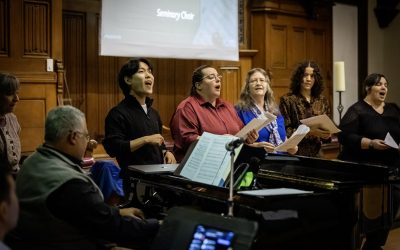Hana Berger Moran was liberated by U.S. forces.

May 2018 – One of the Holocaust’s youngest survivors, Hana Berger Moran, was born on the factory floor in a German concentration camp in April 1945.
Her son, Thomas Berger, his wife, Julie Rosenberg, and their children, Jack and Sasha, came to Drew University to speak of her survival. The talk, presented by the Drew Center for Holocaust/Genocide Study, took place amid a recent survey that found the Holocaust is fading from memory for many Americans.
The trend is concerning, said Joshua Kavaloski, director of the Center. “The past shapes the future,” Kavaloski said. “Learning about and from the Holocaust is crucial.” Survivor testimonies, therefore, are critical.
Berger’s grandmother, Priska, hid her pregnancy from Josef Mengele—the Nazi doctor dubbed the Angel of Death—when she, her husband, Tibor, and other Jews were forced from their homes in Slovakia, according to Berger. Tibor perished; Priska was sent to a work camp in Freiberg where, suffering from malnutrition and weighing just 70 pounds, she gave birth to Hana.
As the Allies closed in, mother and infant were forced to take an open coal-car train ride to another camp, Mauthausen, just before it was liberated by Americans. Hana was among three children born in the camps whose stories were featured in Born Survivors, a book by Wendy Holden. Their births and survival were remarkable as pregnant Jewish women were usually among the first exterminated at the camps.
Following the war, Hana and Priska returned to what became Czechoslovakia. Hana emigrated to Israel as an adult and then to the United States. She is a retired chemist living in California. Her son works in finance in New York.
Through the internet, Hana found and reunited with an American medic, LeRoy “Pete” Petersohn, who aided her mother at liberation, getting life-saving medical treatment to her frail three-pound baby.
Berger’s wife is seeking a publisher for a young-adult book she wrote about her mother-in-law’s odyssey, tentatively titled Googling the Holocaust. The stories are important, said Berger. “We often say the words ‘never forget’ to the point that it rings hollow. But how do we never forget? We have to have narratives, we have to have stories.”


